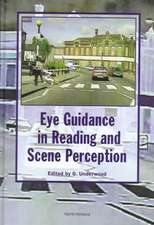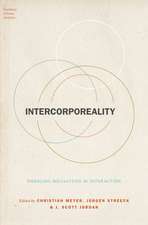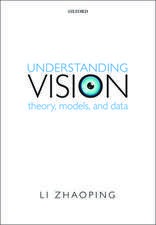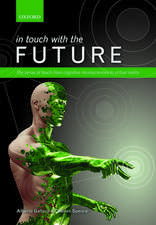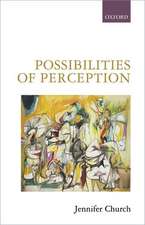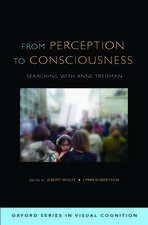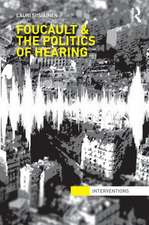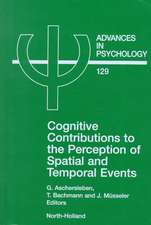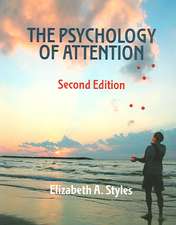System Theories and A Priori Aspects of Perception: Advances in Psychology, cartea 126
Editat de J.S. Jordanen Limba Engleză Hardback – 20 apr 1998
Din seria Advances in Psychology
- 18%
 Preț: 950.00 lei
Preț: 950.00 lei - 18%
 Preț: 985.11 lei
Preț: 985.11 lei - 15%
 Preț: 457.35 lei
Preț: 457.35 lei - 23%
 Preț: 683.48 lei
Preț: 683.48 lei - 23%
 Preț: 675.31 lei
Preț: 675.31 lei - 23%
 Preț: 676.64 lei
Preț: 676.64 lei - 5%
 Preț: 839.37 lei
Preț: 839.37 lei - 5%
 Preț: 834.81 lei
Preț: 834.81 lei - 23%
 Preț: 668.19 lei
Preț: 668.19 lei - 34%
 Preț: 317.98 lei
Preț: 317.98 lei - 23%
 Preț: 674.72 lei
Preț: 674.72 lei - 20%
 Preț: 1422.35 lei
Preț: 1422.35 lei - 27%
 Preț: 737.53 lei
Preț: 737.53 lei - 20%
 Preț: 1519.06 lei
Preț: 1519.06 lei - 5%
 Preț: 1542.08 lei
Preț: 1542.08 lei - 27%
 Preț: 1020.01 lei
Preț: 1020.01 lei - 27%
 Preț: 1127.58 lei
Preț: 1127.58 lei - 27%
 Preț: 1330.32 lei
Preț: 1330.32 lei - 27%
 Preț: 998.93 lei
Preț: 998.93 lei - 27%
 Preț: 1300.14 lei
Preț: 1300.14 lei - 27%
 Preț: 1299.87 lei
Preț: 1299.87 lei - 27%
 Preț: 1080.20 lei
Preț: 1080.20 lei - 27%
 Preț: 1075.55 lei
Preț: 1075.55 lei - 27%
 Preț: 1078.09 lei
Preț: 1078.09 lei - 27%
 Preț: 1161.01 lei
Preț: 1161.01 lei - 27%
 Preț: 763.84 lei
Preț: 763.84 lei - 27%
 Preț: 908.62 lei
Preț: 908.62 lei - 27%
 Preț: 862.90 lei
Preț: 862.90 lei - 27%
 Preț: 770.45 lei
Preț: 770.45 lei - 5%
 Preț: 1010.86 lei
Preț: 1010.86 lei - 23%
 Preț: 713.55 lei
Preț: 713.55 lei - 23%
 Preț: 616.28 lei
Preț: 616.28 lei - 20%
 Preț: 691.31 lei
Preț: 691.31 lei - 23%
 Preț: 628.12 lei
Preț: 628.12 lei - 23%
 Preț: 653.33 lei
Preț: 653.33 lei - 27%
 Preț: 1382.65 lei
Preț: 1382.65 lei - 27%
 Preț: 1134.35 lei
Preț: 1134.35 lei - 23%
 Preț: 620.13 lei
Preț: 620.13 lei - 23%
 Preț: 651.55 lei
Preț: 651.55 lei - 23%
 Preț: 627.38 lei
Preț: 627.38 lei - 23%
 Preț: 616.73 lei
Preț: 616.73 lei - 27%
 Preț: 1051.14 lei
Preț: 1051.14 lei - 23%
 Preț: 627.09 lei
Preț: 627.09 lei - 27%
 Preț: 1198.73 lei
Preț: 1198.73 lei - 27%
 Preț: 1109.39 lei
Preț: 1109.39 lei - 27%
 Preț: 969.09 lei
Preț: 969.09 lei - 27%
 Preț: 1107.69 lei
Preț: 1107.69 lei - 5%
 Preț: 837.76 lei
Preț: 837.76 lei - 23%
 Preț: 621.30 lei
Preț: 621.30 lei
Preț: 1076.26 lei
Preț vechi: 1474.33 lei
-27% Nou
Puncte Express: 1614
Preț estimativ în valută:
205.95€ • 220.22$ • 171.71£
205.95€ • 220.22$ • 171.71£
Carte tipărită la comandă
Livrare economică 17 aprilie-01 mai
Preluare comenzi: 021 569.72.76
Specificații
ISBN-13: 9780444826046
ISBN-10: 0444826041
Pagini: 366
Ilustrații: 1
Dimensiuni: 156 x 234 x 22 mm
Greutate: 0.71 kg
Editura: ELSEVIER SCIENCE
Seria Advances in Psychology
ISBN-10: 0444826041
Pagini: 366
Ilustrații: 1
Dimensiuni: 156 x 234 x 22 mm
Greutate: 0.71 kg
Editura: ELSEVIER SCIENCE
Seria Advances in Psychology
Cuprins
Preface. List of Contributors. Historical Perspective. Control systems with a priori intentions register environmental disturbances a posteriori (W.A. Hershberger). William James, chaos theory, and conscious experience (A.R. Bailey). Systems theories: their origins, foundations, and development (A. Laszlo, S. Krippner). Systems-theoretical Models of Perception. Neural networks and perception (I.E. Dror, C.S. Schreiner). Broad mindedness and perceptual flexibility: lessons from dynamic ecosystems (W.A. Johnston et al.). Sensory capture and the projection of conscious perception (T.M. Cowan et al.). Systems-theoretical Models of Perception and Action. Perceiving one's own action–and what it leads to (B. Hommel). Intentionality, perception, and autocatalytic closure: a potential means of repaying psychology's conceptual debt (J.Scott Jordan). What do event-related brain potentials tell us about the organization of action: cognitive-psychological and biological approaches (B. Kotchoubey). Chaos-theoretical Models of Perception. How a priori image-schematic, simulative neuro-algorithms provide us with mental universals which parallel physical world principles (L.R. Vandervert). Visual perception at the edge of chaos (C. van Leeuwen). Phase transistions in cognition (G. Vetter, M. Stadler). Stability and instability in the dynamics of perceptual learning (J.B. Cooney). Author and subject index.

